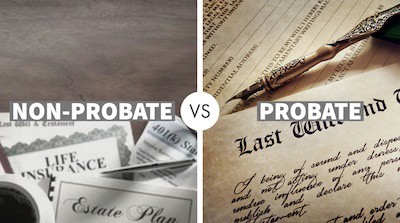
Probate vs Non-Probate assets – which is which?
Assets that are held in a person’s sole name and do not have a pre-determined beneficiary are considered probate assets (testamentary assets). This means that they pass to your beneficiaries inside the estate, and they are distributed after death by filing a New York probate estate proceeding with the Surrogate’s Court.
What are Probate Assets
Probate assets are assets owned by the decedent individually at the time of death, to which the owner did not designate a beneficiary. Probate assets owned at the time of death may include the following types of personal and/or real property:
- The primary residence, second home, vacation property and/or investment real estate (if no one else is on the title)
- Automobiles, other motor vehicles and vessels
- Cash in separate bank accounts or safe deposit box contents, stocks, bonds and other investment holdings
- Collectibles such as artwork, books or coins
- Jewelry
- Household furnishings and clothing and other personal items
- Royalties
- Sale of business assets and interests
- Wrongful death proceeds
- Medical malpractice proceeds
What are Non-Probate Assets
Non-probate assets are assets that are either owned jointly with someone else or have a designated beneficiary. The following are considered non-probate assets and pass outside your estate by law. They are not part of the probate of your estate and do not require Court approval.
- Pension accounts
- 401(k), profit sharing
- life insurance, annuities
- joint bank accounts and community
- property assets such as your home that you own jointly with your spouse
- assets that you own jointly with other family members, friends, associates or business partners
- and assets placed in a living trust
When looking at probate vs non-probate, it’s important to check the name on the asset and whether there is a designation of beneficiary. If the name is of the decedent, and there is no designation of beneficiary, then it’s likely probate. If it’s not in the name of the decedent and there is no designation of beneficiary, then it’s likely non-probate. Always consult a New York estate lawyer before making any decision on your estate.
New York Court Procedure for Probate Assets
The original will and death certificate are filed by the Executor with the Court as proof of death.
If someone died intestate (without a will), any interested party in the estate may file a probate action with the Court requesting letters of administration. The probate assets will then be distributed in accordance with the New York Probate Laws by the Court-appointed administrator of the estate. The priority of distribution of assets when one dies intestate in New York starts with your surviving spouse, then children, grandchildren, parents, siblings and other persons that may qualify under the law.
The executor, administrator or personal representative of the estate will compile a list of assets and is also in charge of managing, investing and selling probate assets as well as preparing an accounting for the beneficiaries. After the probate assets are distributed to the beneficiaries and the bills and claims are paid by the executor, administrator or personal representative, the estate winds up and is closed.
Since New York Probate Laws are complex and most people do not understand the probate vs non-probate distinction. They seek the advice of an experienced and trained New York Probate Attorney to figure out the probate vs non-probate issue. An attorney understands which asset is probate and which asset is non-probate, understands the probate process and can file the appropriate paperwork with the court as well as help ensure that the process goes smoother and the beneficiaries receive their fair and legal shares of the probate assets in a timely and stress-free manner.
If you need help with a probate or estate administration matter, call you can give me a call. I am a New York estate attorney with over a decade of experience. I can be reached at (212) 233-1233.













